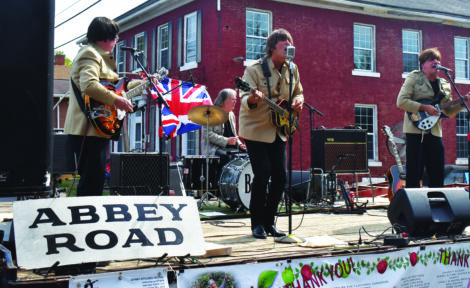Health board tackles 2026 fees
By MORGAN AHART
Staff Writer
SALEM — The board of health held the first reading of the proposed food service, tattoo and piercing, and public swimming pool safety fees for 2026 in its meeting Wednesday.
Each year the department drafts and proposes fees using a cost methodology based on the time spent by the department on the licensing, inspection and administration of the program. These fees must then receive three readings by the board, with a public hearing preceding the final reading which is currently scheduled for Nov. 19.
The plan review fee for businesses selling food will remain set at $275 for both new establishments and remodels, and both food service and public pool fees do not include the additional fees charged to operate by the state.
The proposed 2026 food service fees are (with last year’s fees in parentheses): risk classification less than 25,000 square feet, level one $135.97 ($116.87), level two $151.61 ($129.63), level three $278.89 ($291.46); and level four $349.89 ($291.46); more than 25,000 square feet, level one $191.01($161.79), level two 200.40($169.45), level three $678.90 ($559.98), and level four $718.94 ($592.66); vending operation $15.12($14.66); mobile facility high risk $115 ($103.40), low risk $57.50 ($51.70); food truck permit, yearly $100, daily $137.50; inspections for the super cruise $25 and an additional $10 per unit; and temporary facility (per event), ($0).
Crowl said that she had also updated the city’s cost methodologies for pool and tattoo safety fees so that the fees actually match the department’s inspection costs. The proposed inspection fees for both pools and spas are $250, an increase of $45 from last year’s fee of $205, with the fee for additional units at the same location rising to $145 from $100. Inspections for tattoo or piercing establishments would increase $5 from $150 to $155, while the fee for a combined tattoo and piercing establishment will rise $10 from $300 to $310. The proposal would also see the registration fee for both artists and apprentices rise to $45 from $40 last year.
During her report Director of Nursing Chelsea Clark said that there were eight confirmed cases of covid-19 in the city in August and that the number of cases in the area was beginning to rise. She also said that while they were down from last month another confirmed case of an STI had been reported and that she was investigating possible sources of grant funding to potentially offer STI testing. Clark said she had also resumed attending the suicide prevention coalition and that she would be reaching to the Columbiana County and East Liverpool Health Departments to attend as well, explaining that if multiple public health organizations attend it can count towards their accreditation.
Clark also reported that one of the department’s vaccine refrigerators was serviced for a slow gas lack which was compromising the unit’s ability to stay within the required temperature range and had recently required its contents to be moved to another unit before being serviced. However, the temperature has begun to slip again, and the department may need to consider purchasing a new unit soon as the repair company advised that purchasing a new fridge would be more cost effective than repeatedly servicing and refilling the gas within the heat pump of the current one.
The board also received an update on the status of the Salem City Trap, Neuter, and Release (TNR) project from TNR Project Coordinator Brenda Austin. Austin told the board that so far 75 cats had been trapped neutered and vaccinated as part of the program and that most had found permanent homes or were placed with an adoption program through the efforts of TNR Project volunteers, meaning that they did not have to be returned to neighborhoods where they were trapped which would have been legally required otherwise. She said that of the 37 cats trapped in June none had been returned to the street, while four of the 15 trapped in July, eight of the 15 trapped in August and two of the five cats trapped thus far in September have been returned.
She said that the number of being trapped had reduced since June due to a lack of clinic availability, explaining that while Angels for Animals was able to “make time” for the initial push when the program was founded the TNR Project was now limited to the typical limit of two cats per day which are neutered and vaccinated for rabies at a cost of $35 per cat. She also noted that by collaborating with the Columbiana County Humane Society that they are sometimes able to bring in three cats in a single day. However, Austin also told the board that she had begun utilizing AlterClinic Animal Care in Canton which will take any number of cats with prior registration and administers an additional vaccination for common respiratory illnesses and tips the cats’ ear for $46.
Austin asked if it would be possible for TNR calls to be routed through the health department as currently she only has her personal cell phone for TNR Project operations and Crowl said that she didn’t think that would be an issue and that an option could be added to the department’s call filtering system for the program. Crowl also said that the appropriate line items for donations for the TNR Project had been established, as the project’s finances are routed through the health department by ordinance, and that both monetary donations, and material donations like cat traps for the program could now be made through the health department.
The board of health will meet next at 2 p.m. Oct. 15.
mahart@mojonews.com



